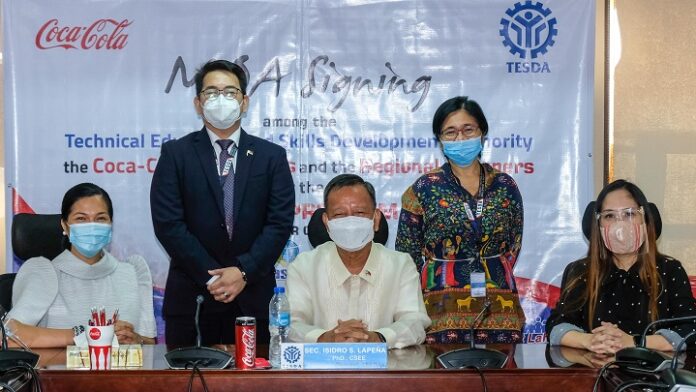It was in 2011 when a consortium led by Coca-Cola Philippines and the Technical Education and Skills Development Authority (TESDA) came together to form what was to become the Sari-Sari Store Training and Access to Resource (STAR) program. Part of Coca-Cola’s 5by20 global initiative, the STAR program soon proved to be a truly impactful undertaking that exceeded the expectations of partners and stakeholders.
The 5by20 global initiative called for the empowerment of five million women micro-entrepreneurs by 2020 around the world. In the Philippines, the STAR program has since been able to reach its 200,000 by 2020 target ahead of schedule, with participants successfully undergoing a 12-session training program from TESDA.
The micro-entrepreneurs, mostly sari-sari store owners, also received support from partner microfinance organizations such as ASA Philippines Foundation, AlalaysaKaunlaran Inc. (ASKI), Negros Women for Tomorrow Foundation (NWTF), First Community Cooperative (FICCO), and Tagum City Council of Women Foundation, Inc. (TCCWFI).
As most businesses were hit hard by the ongoing pandemic that forced the domestic economy into recession, the proponents of the STAR program quickly put into action their digital roadmap to help micro-entrepreneurs adapt with the new digital reality.
“In the midst of every crisis lies an opportunity,” says Jonah de Lumen-Pernia, Coca-Cola Philippines public affairs and communications director. “In front of us is an opportunity to reach more people through our shift from face to face STAR training towards online blended learning. The beauty of digital is that it levels the playing field thus making it inclusive for all.”
The program is now also more socially inclusive and equitable with the addition of significant enhancements to the existing gender-sensitive curriculum design and methodology of the STAR program. Secretary Isidro S. Lapeña, director general of Technical Education and Skills Development Authority, even mentioned that “the iSTAR beneficiaries can also look forward to receiving support to improve their income and economic status in terms of marketing and linkages.”
The TESDA chief has always stressed the importance of partnerships with the private sector and key industries to ensure that the skills the learners acquire from TESDA will result to a job or livelihood after.
“This partnership with Coca-Cola Philippines would really help our kababayans, especially the women, develop entrepreneurial attitude, something that would be very useful during this time of pandemic,” Lapeña added.
The iSTAR program has an enhanced approach that consists of 80% online self-paced learning session and 20% face-to-face coaching session. It breaks physical, geographical, and financial boundaries to become more responsive in today’s challenging times, leveraging on the power offered by digital learning tools, the roadmap of which was already started in December 2019.
“The digital roadmap of STAR Program, through iSTAR, has always been the sustainability mechanisms that we put in place for the future of micro-retailers’ empowerment. With our equally passionate regional partners, we bring the program to every corner of the country.”says Joy Munsayac-Cacal, Coca-Cola Philippines public affairs and sustainability manager and iSTAR National Program chairperson.
“This moment is very symbolic because this partnership not only brings the private and public sector together but is also a milestone towards achieving one of the UN (United Nations) development goals which is women empowerment,” says Aniceto R. Bertiz III, deputy director general, Partnerships and Linkages, TESDA.
Using the eTESDA website as a platform, iSTAR consists of 4 learning modules: (1) building business mindset and values, (2) planning the business and understanding concepts, (3) professionalizing daily business operations, and (4) sustaining business sustainability and success. Instructional videos and informative games along with lectures from subject matter experts will be utilized, while a virtual coach dubbed “Coach Christine” will also be made available to participants.
Overall, the iSTAR program builds upon the achievements of the STAR program, as the proponents set out to reach and impact more women entrepreneurs in a positive, uplifting way. Mass recruitment for the iSTAR program is slated to start in November to December of this year, with an initial target of 10,000 enrollees.
Photo caption: At the signing of the memorandum of agreement for the iSTAR program.
